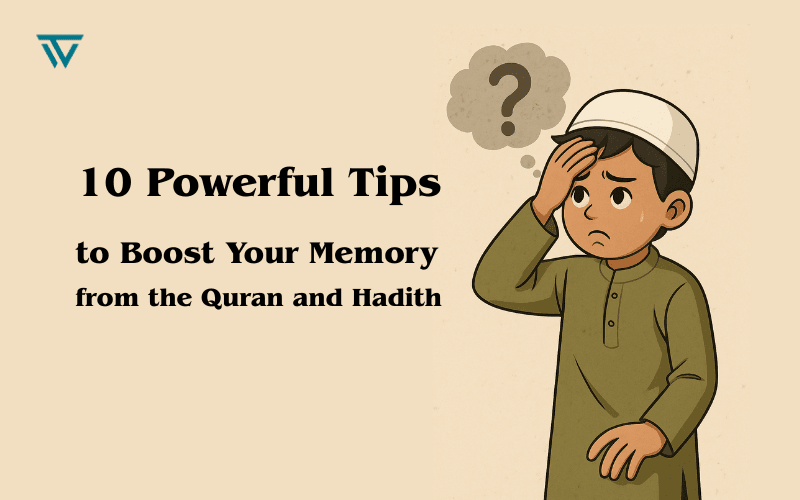Dua for Improving Memory – A Practical Islamic Guide

For many of us, especially as we get older, there is a deep desire to memorize new Surahs from the Qur’an. This often leads us to search for a dua for improving memory and other practical methods. Many of us have tried. Some have been and continue to be successful. Others, however, have given up after facing challenges, believing their memory has weakened. So, what is the solution to improving our memory? Let’s explore some strategies from an Islamic perspective.
Memory is the process of storing and retrieving information. Scientists categorize our memory into two main types:
- Short-term memory: This is where information is stored in our brain for a very brief period.
- Long-term memory: This is where memories are stored in our brain for an extended time.
In this article, we will focus on techniques to enhance our long-term memory.
1. Sincerity (Ikhlas)
The foundation of success in any endeavor is Ikhlas, or sincerity. The core of sincerity is a pure intention. Regarding the importance of pure intention, Ustadh Khurram Murad said:
“The intention is like the soul in our body or the life force within a seed. Most seeds look more or less the same, but when they are planted and grow into seedlings and begin to bear fruit, the real difference becomes clear. Similarly, the purer our intention, the better the outcome of our actions.”
In this context, Allah (SWT) says:
وَمَآأُمِرُوٓا۟إِلَّالِيَعْبُدُوا۟ٱللَّهَمُخْلِصِينَلَهُٱلدِّينَحُنَفَآءَوَيُقِيمُوا۟ٱلصَّلَوٰةَوَيُؤْتُوا۟ٱلزَّكَوٰةَۚوَذَٰلِكَدِينُٱلْقَيِّمَةِ
“And they were not commanded except to worship Allah, [being] sincere to Him in religion, inclining to truth, and to establish prayer and to give zakah. And that is the correct religion.”
[Surah Al-Bayyinah (98):5]
Therefore, our intention should be that Allah strengthens our memory solely for the benefit of Islam.
2. The Ultimate Dua for Improving Memory: Supplication and Dhikr
We all know that success in any task is impossible without Allah’s help. For this reason, we should always pray to Allah to increase our memory and grant us beneficial knowledge. We can recite the following Du’a from the Qur’an:
وَقُلرَّبِّزِدْنِىعِلْمًا
“My Lord, increase me in knowledge.”
[Surah Taha (20):114]
While this verse is a powerful supplication for knowledge in general, it is considered by many to be the most essential dua for improving memory and understanding. Furthermore, Dhikr, or the remembrance of Allah, also helps in strengthening memory. Allah (SWT) says:
وَٱذْكُررَّبَّكَإِذَانَسِيتَ
“And remember your Lord when you forget”
[Surah Al-Kahf (18):24]
Therefore, we should constantly remember Allah through Dhikr, including Tasbih (Subhan’Allah), Tahmid (Alhamdulillah), Tahlil (La ilaha illallah), and Takbir (Allahu Akbar).
3. Abstaining from Sin
A persistent effect of committing sins is a weakened memory. The darkness of sin and the light of knowledge cannot coexist. Imam ash-Shafi’i (may Allah have mercy on him) said:
“I complained to my Sheikh, Waki’, about my poor memory, and he instructed me to abstain from sinful acts. He said that the knowledge of Allah is a light, and the light of Allah is not bestowed upon a sinner.”
Al-Khatib al-Baghdadi narrates in Al-Jami’ (2/387) that Yahya bin Yahya said:
“A man asked Malik ibn Anas, ‘O Abu Abdullah, is there anything that can strengthen my memory?’ He replied, ‘If anything can strengthen the memory, it is abandoning sin.'”
When a person sins, it leads to anxiety and sorrow. He becomes preoccupied with his misdeeds, which dulls his senses and diverts him from beneficial actions like acquiring knowledge. Therefore, we must make every effort to stay away from sin.
4. Experimenting with Different Methods
If we look closely, we’ll notice that everyone’s memorization method is different. Some memorize faster while lying down, while others do so while walking. Some prefer to study in silence, while others read aloud. Some memorize best early in the morning, while others are more effective late at night. Therefore, each of us should identify our most suitable time and environment and use it effectively.
When memorizing the Qur’an, it’s beneficial to use a specific Mushaf (Arabic copy of the Qur’an). This is because different editions have varying layouts of pages and verses. Using one specific Mushaf consistently creates a mental map in the brain, helping to embed the memorized portion deeply in the mind.
5. Applying What You’ve Memorized
We can all agree that the more we review a subject, the more firmly it is stored in our brain. However, in our busy lives, we may not have much time for repetition. But we can kill two birds with one stone. We can recite the Surahs or parts of Surahs we have memorized in our Sunnah and Nafl (voluntary) prayers. This practical revision is a key technique for anyone wondering how to memorize Quran faster, as it reinforces the verses without requiring extra study time. This not only puts our knowledge into practice but also serves as a powerful revision tool.
6. Teaching Others
An excellent way to learn something is to teach it to someone else. Teaching requires us to review the same material repeatedly and from various sources. This process helps to permanently fix the information in our memory.
7. Consuming Brain-Healthy Foods
A balanced and moderate diet is essential for the health of our brain. Overeating increases sleepiness, which makes us lazy and turns us away from seeking knowledge. Certain foods are particularly beneficial for the brain. A recent study in France found that olive oil improves visual memory and verbal fluency. Foods rich in Omega-3 fatty acids are also highly beneficial for memory and brain function.
Many scholars have recommended specific foods for enhancing memory. Imam az-Zuhri said:
“You should consume honey, for it is good for the memory.”
Honey contains free sugars that play a vital role in brain function. Moreover, honey is absorbed into the bloodstream and starts working within seven minutes of consumption. Imam az-Zuhri also said:
“Whoever wishes to memorize Hadith should eat raisins.”
Combining these healthy foods with a consistent dua for improving memory creates a powerful, holistic approach to strengthening your mental faculties.
8. Getting Adequate Rest
When we sleep, our brain works like a busy office, processing the information gathered throughout the day. Sleep is also crucial for rebuilding brain cells and relieving fatigue. Furthermore, a short nap in the afternoon (a practice known as Qailulah) can boost our mood and cognitive function, and it is also a Sunnah (practice of the Prophet Muhammad ﷺ). The negative effects of excessive sleep have already been mentioned. Therefore, instead of staying up late doing Dawah on social media, we should give our brains adequate rest.
9. Eliminating Distractions
A major reason for our declining brain performance and reluctance to acquire knowledge today is that we involve ourselves in various unnecessary activities. As a result, we cannot focus deeply on any single task. Sometimes, our situation is such that after completing a portion of our Salah (prayer), we cannot remember exactly how much we have prayed. The root cause of this is engaging in time-wasting activities like gossip, listening to music, watching movies, and excessive use of Facebook. We should try our best to stay away from these things.
10. Perseverance and Not Giving Up
A key to success in any task is not to give up. The beginning of any memorization effort can be difficult. However, over time, our brain adapts. Therefore, instead of giving up at the first sign of failure, we should continue our efforts with Tawakkul (trust) in Allah.
Conclusion
In conclusion, memory is not a magical or isolated faculty but an integral part of our lifestyle. The ten strategies discussed in this article—from purifying our intentions and seeking Allah’s help to avoiding sin, adopting healthy habits, and persevering—all point toward a better, more disciplined life. The effort to improve memory is fundamentally an integrated pursuit of one’s spiritual and worldly development. Therefore, by applying these strategies with full trust in Allah and without becoming discouraged, we can strengthen our memory not only for acquiring knowledge but also for drawing closer to Allah, Insha’Allah (God willing).
Related article: Dua After Salah According to Quran and Hadith









